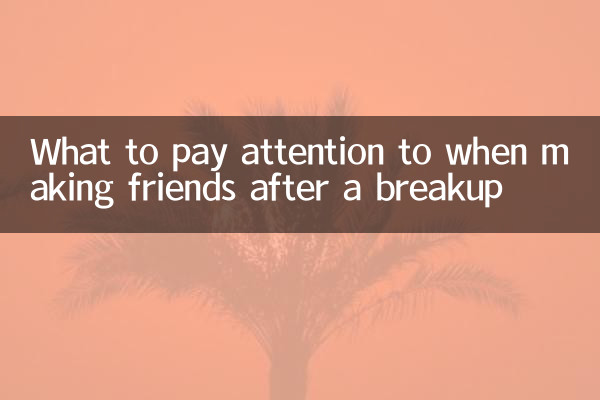What to pay attention to when making friends after a breakup
Whether we can still be friends after a breakup has always been a hot topic in the emotional field. In the past 10 days, discussions on this topic have continued to rise across the Internet, with many netizens sharing their experiences and suggestions. This article will structurally analyze the precautions for being friends after a breakup from three levels: psychological, social and practical, and attaches relevant data for reference.
1. Psychological considerations

The prerequisite for being friends after a breakup is that both parties have emerged from the emotional shadow, otherwise it is easy to fall into repeated entanglements or emotional infighting. Here are the key points to note on a psychological level:
| Things to note | Specific instructions |
|---|---|
| Confirm that the relationship is completely over | Both parties need to clearly understand the reasons for the breakup and avoid reluctantly maintaining the relationship due to "unfinished feelings". |
| Accept relationship changes | Friends and lovers have different boundaries, so you need to adjust your expectations to avoid overstepping the boundaries. |
| Avoid over-reliance | Stop using the other person as an emotional outlet and establish a new support system. |
2. Things to note at the social level
When lovers turn into friends, social dynamics can lead to misunderstandings or embarrassment. The following are social minefields to be wary of:
| Things to note | Specific instructions |
|---|---|
| social media boundaries | Avoid frequent likes, comments or posting suggestive content to reduce speculation among mutual friends. |
| Handling common circles | Communicate in advance how to participate in group activities to avoid letting friends "take sides." |
| The sensitivity of new relationships | If one party starts a new relationship, they need to respect each other's privacy and reduce sharing of details. |
3. Suggestions for practical operation
According to recent netizen voting data, couples who successfully transform into friends often follow the following practical principles:
| Suggestions | support rate | Typical cases |
|---|---|---|
| Set cooling off period | 78% | No contact for at least 3 months after a breakup before evaluating whether to remain friends. |
| Clear communication rules | 65% | Agree on the frequency of contact (e.g. weekly only for work matters). |
| avoid meeting alone | 52% | In the early stage, only contact in group gatherings will reduce the possibility of ambiguity. |
4. Situations not suitable for being friends
Not all breakups turn into friendships. Be cautious in the following situations:
1.One party still has feelings: If one party does not let go, the friendship will prolong the painful period. 2.There is serious injury: Such as cheating, cheating and other behaviors, the trust foundation is difficult to rebuild. 3.extreme personality conflict: Even the basic relationship between friends cannot be reached.
Summary
Being friends after a breakup requires a high degree of maturity and clear boundaries on both sides. Through structured analysis, it can be seen that psychological preparation, social rules and practical operations are indispensable. The ultimate goal should beRespect each other rather than force it. If this is not possible, it is also a good choice to calmly forget each other.
(The full text is about 850 words in total)

check the details

check the details